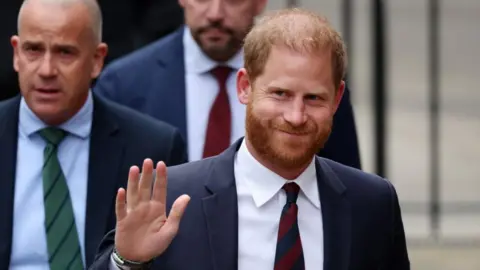Harry's step back from royals led to 'unique' circumstances, court told
 EPA
EPAPrince Harry's decision to step back from his life as a working royal resulted in a "unique set of circumstances", a government barrister has told the Court of Appeal.
Sir James Eadie KC said it was right to take a flexible approach to the level of personal security he should be given after he stepped back in early 2020.
The Duke of Sussex has asked three judges to overturn a decision to downgrade the police protection he is given at public expense when he visits the UK.
His barrister said the duke's life was "at stake" and he had been given a security process that he knows "is manifestly inferior in every respect".
Prince Harry was in court again for the second day of the hearing, with a crowd of photographers and onlookers waiting when he arrived and waved to reporters.
Sitting next to his solicitor, the duke occasionally made notes as he listened to Sir James set out the government's position.
Sir James told the court the Royal and VIP Executive Committee (Ravec), which decides security levels, was governed by "royal prerogative" - not the requirements of any law.
Its chair, Sir Richard Mottram, had been in charge for more than a decade and was "front line responsible" if Ravec got it wrong, he said.
As a senior civil servant with experience overseeing national security, "it's hard to imagine a decision maker better placed to form his own view", he told the court.
While Ravec had "terms of reference" for deciding security measures, there was "nothing to suggest they were designed to operate rigidly and not flexibly".
Unlike most of the senior members of the Royal Family, Prince Harry decided to live abroad and not carry out official engagements.
He previously said the safety of his family, with whom he moved to California in 2020, was at the heart of the case.
This decision was in a "category of its own", Sir James said, and the committee was right to consider the case on its merits.
The core objective of the committee's members and advisers, he said, was "to make nuanced judgments about security protection bringing all of their expertise to bear including making decisions about unusual cases and what process should most appropriately be followed".
He added later that the decision on Prince Harry's security was "considered with care" and "nothing was excluded or shut down in the future", including conducting a risk assessment.
In closing remarks, Shaheed Fatima KC said of the duke, sat two rows behind: "There is a person sitting behind me whose safety, whose security and whose life is at stake.
"There is a person sitting behind me who has been told that he is getting a special, bespoke process, when he knows and has experienced a process that is manifestly inferior in every respect."
"His presence here, and throughout this appeal, is a potent illustration, were one needed, of how much this appeal means to him and his family," she added.
Because the Home Office has legal responsibility for Ravec's decisions, it is opposing the appeal on its behalf.
The duke's security in the UK is currently decided on a case-by-case basis, the same way as the country's other high-profile visitors.
The details of Prince Harry's current security arrangements, and the levels he would like to receive, have not been discussed in court, for security reasons.
More sensitive information was discussed in a closed hearing, without the media present, on Wednesday afternoon.
After the public hearing, a woman who had been sitting in the court shouted at journalists: "If you're members of the press, you're the reason he's not in England."
Prince Harry's bodyguards led him out of the court before she was allowed to leave.
He then returned for the private section of the hearing before Sir Geoffrey Vos, Lord Justice Bean, and Lord Justice Edis, which concluded on Wednesday afternoon.
A written decision is expected at a later date.
On Tuesday, Ms Fatima told the court Prince Harry had been subject to a "so-called bespoke process" with regards to his UK security, that saw him "singled out for different, unjustified and inferior treatment".
She told the court Ravec had not followed its own standard procedures, because it chose to downgrade his security without having expert analysis of the risks he faced.
She argued the previous judge was wrong to have concluded that the committee could make decisions without such analysis, and said the duke does not accept that "bespoke" means "better".

Sign up here to get the latest royal stories and analysis every week with our Royal Watch newsletter. Those outside the UK can sign up here.
